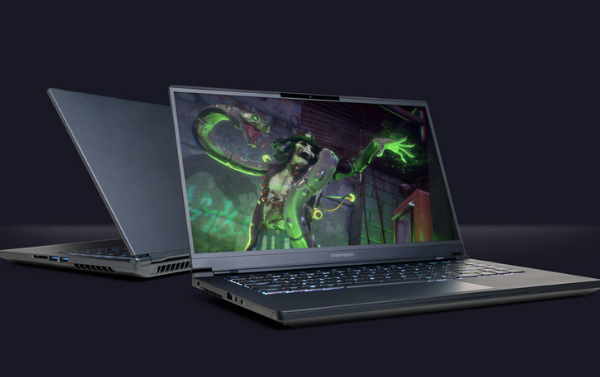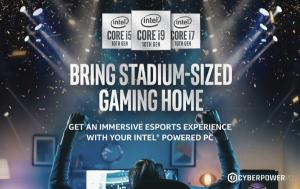
For many professionals, using laptops for work is almost mandatory – especially in the age of socially distanced telecommuting. At the same time, many of us might want to indulge in a spot of gaming while we’re out and about. If you find yourself in this position, you might wonder whether it’s possible to use your gaming laptop for work or vice versa?
One option is to buy two laptops to cater to these distinct demands. But, if you think about it, people who buy workstation laptops and separate gaming laptops are being incredibly wasteful. You’re going to be buying two screens, two graphics cards, two CPUs – but you’re only going to be using one at a time. It’s better to consolidate your spending into a single item and get twice the power than you would otherwise for gaming and productivity. With the release of 10th-gen Intel laptops, your money now goes an extremely long way: so, is it worth going for a machine that can help with remote working and also gaming?

Are Gaming Machines built for Professional Applications?
Gaming PCs, whether they’re laptops or desktops, are designed to do one thing extremely well, and that’s play games. While certain sorts of games might lean more heavily on some components than others, this is a principle that holds true.
Of course, many of the same virtues that make games run faster might equally bolster your productivity. An NVMe hard drive is going to decrease loading times in games, but it’ll also make large files open faster. A 144Hz display will make gaming at high frame rates possible, but it will also make the desktop experience that much zippier. A faster CPU might mean superior physics and AI performance in-game, but it’ll give more-or-less proportional benefits in professional applications, and so on.
Different pieces of software are built to take advantage of differently constituted hardware. Many games, for example, might leverage just four of your CPU’s cores. Most video-editing software, conversely, isn’t built to leverage the power of a gaming graphics card. If you’re asking a computer to perform a wide range of tasks, then it’s best to go for something balanced – while still weighing up which components are most important for your circumstances.
Where are the Differences?
Despite these broader similarities between gaming laptops and professional ones, there are some key differences.
The Graphics Card
In most gaming set-ups, the graphics card is the star of the show. It’s the job of this device to generate the gaming environment – that means accounting for the position of every triangle relative to the player, working out all of the textures and normal-mapping, applying some post-processing, and tracing a few rays. And it means doing all that several dozen times every second!
High-end graphics cards can easily add several hundred pounds, maybe more, to the cost of a gaming laptop. If you’re looking to balance your build toward productivity, then this is the place to make tweaks: by opting for a slightly less powerful graphics card, you might find that your budget will stretch to the newer generation of Intel CPUs, which, as well as offering productivity benefits, also tend to improve your performance in-game.
Portability
For decades, there’s been a trend toward thinness from laptop manufacturers, exemplified by Apple’s ‘Air’ line of machines. As components have got smaller and display technology has dispensed with the backlight, laptops have become progressively svelte, to the point that a lightweight laptop weighs just 2kg (or less).
This is all very well and good for low-intensity workloads. If all you’re going to be running is Microsoft Excel, then a thin laptop is perfectly fine, and after all, such programs could easily be run on a mid-powered smartphone.
Gaming laptops, however, tend to be on the chunkier side. Most of this extra baggage can be blamed on the battery. Since gaming demands greater feats of computation, it also demands greater power consumption. To compensate for this, manufacturers need to ship larger batteries.
We should also bear in mind that premium gaming components tend to be inherently chunkier. While both Nvidia and AMD have done great things condensing their high-end cards into smaller packages, these components still require sizeable heatsinks to dissipate the heat away from the circuitry itself.
Cost
There’s a reason your workplace isn’t kitted out with a fleet of monster gaming PCs. Gaming requires more expensive hardware than running a typical office program. Microsoft, and companies like them, invest considerable resources into optimising their programs to run on inferior machinery. After all, the average triple-A game might ship a few million units, whereas something like Microsoft Word is installed on more than a billion machines worldwide, many of which are more than 10 years old.
We should also bear in mind the potential that your laptop might suffer damage, especially if you’re taking it into messy workplaces where spillages occur. The more expensive the laptop, the more expensive it will be to replace. Offset this cost by adding the device to your home insurance, and by investing in a sturdy carry case.
Future-proofing
There is a sense in which a gaming laptop might make financial sense in the long run. Since the hardware is more powerful, it will be able to run the programs of the future without any problems. Of course, your mileage may vary, depending on the precise make-up of your machine.
Maintaining Digital Work/Life Balance
It’s often a good idea to set up separate logins for work and play. That way, you can keep the desktop tidy, all of your stuff accessible, and you’ll be free from distractions. Plus, if you’re at work, you won’t have the unease that comes with a less-than-professional Windows background.
If you’re really concerned about keeping your work and play separate, or you’d like to run a different OS for gaming than for productivity, you can partition your storage drive and have the machine act as two separate computers. This is a technique known as dual-boot, and it’s straightforward to set up.
Decision time
Gaming laptops can do just about everything the average work laptop can, and a lot more besides. They’re more cumbersome and heavy, and there was a time when they all sported eye-catching Michael-Bay-inspired looks that weren’t for everyone. But these drawbacks have got less pronounced in recent years. Buy a modern gaming laptop, and you can be reasonably sure it’ll chew up all of the work-related tasks that you can throw at it, without compromising your ability to unwind during your downtime.
[su_row][su_column size=”1/4″ center=”no” class=””] [/su_column] [su_column size=”3/4″ center=”no” class=””]
[/su_column] [su_column size=”3/4″ center=”no” class=””]
[/su_column][/su_row]
[su_spacer size=”10″]